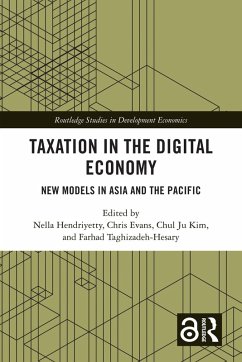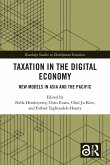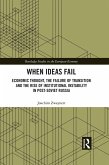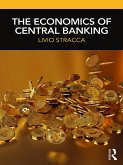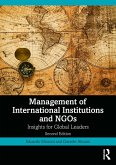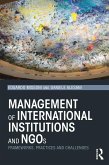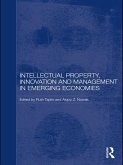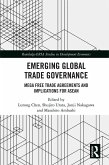Taxation in the Digital Economy (eBook, PDF)
New Models in Asia and the Pacific
Redaktion: Hendriyetty, Nella; Taghizadeh-Hesary, Farhad; Kim, Chul Ju; Evans, Chris
0,00 €
0,00 €
inkl. MwSt.
Sofort per Download lieferbar

0 °P sammeln
0,00 €
Als Download kaufen

0,00 €
inkl. MwSt.
Sofort per Download lieferbar

0 °P sammeln
Jetzt verschenken
Alle Infos zum eBook verschenken
0,00 €
inkl. MwSt.
Sofort per Download lieferbar
Alle Infos zum eBook verschenken

0 °P sammeln
Taxation in the Digital Economy (eBook, PDF)
New Models in Asia and the Pacific
Redaktion: Hendriyetty, Nella; Taghizadeh-Hesary, Farhad; Kim, Chul Ju; Evans, Chris
- Format: PDF
- Merkliste
- Auf die Merkliste
- Bewerten Bewerten
- Teilen
- Produkt teilen
- Produkterinnerung
- Produkterinnerung

Bitte loggen Sie sich zunächst in Ihr Kundenkonto ein oder registrieren Sie sich bei
bücher.de, um das eBook-Abo tolino select nutzen zu können.
Hier können Sie sich einloggen
Hier können Sie sich einloggen
Sie sind bereits eingeloggt. Klicken Sie auf 2. tolino select Abo, um fortzufahren.

Bitte loggen Sie sich zunächst in Ihr Kundenkonto ein oder registrieren Sie sich bei bücher.de, um das eBook-Abo tolino select nutzen zu können.
This book presents a critical review of the status of tax systems in Asia and the Pacific in the era of the digital economy.
- Geräte: PC
- ohne Kopierschutz
- eBook Hilfe
- Größe: 9.61MB
Andere Kunden interessierten sich auch für
![Taxation in the Digital Economy (eBook, ePUB) Taxation in the Digital Economy (eBook, ePUB)]() Taxation in the Digital Economy (eBook, ePUB)0,00 €
Taxation in the Digital Economy (eBook, ePUB)0,00 €![When Ideas Fail (eBook, PDF) When Ideas Fail (eBook, PDF)]() Joachim ZweynertWhen Ideas Fail (eBook, PDF)46,95 €
Joachim ZweynertWhen Ideas Fail (eBook, PDF)46,95 €![The Economics of Central Banking (eBook, PDF) The Economics of Central Banking (eBook, PDF)]() Livio StraccaThe Economics of Central Banking (eBook, PDF)40,95 €
Livio StraccaThe Economics of Central Banking (eBook, PDF)40,95 €![Management of International Institutions and NGOs (eBook, PDF) Management of International Institutions and NGOs (eBook, PDF)]() Eduardo MissoniManagement of International Institutions and NGOs (eBook, PDF)65,95 €
Eduardo MissoniManagement of International Institutions and NGOs (eBook, PDF)65,95 €![Management of International Institutions and NGOs (eBook, PDF) Management of International Institutions and NGOs (eBook, PDF)]() Eduardo MissoniManagement of International Institutions and NGOs (eBook, PDF)62,95 €
Eduardo MissoniManagement of International Institutions and NGOs (eBook, PDF)62,95 €![Intellectual Property, Innovation and Management in Emerging Economies (eBook, PDF) Intellectual Property, Innovation and Management in Emerging Economies (eBook, PDF)]() Intellectual Property, Innovation and Management in Emerging Economies (eBook, PDF)44,95 €
Intellectual Property, Innovation and Management in Emerging Economies (eBook, PDF)44,95 €![Emerging Global Trade Governance (eBook, PDF) Emerging Global Trade Governance (eBook, PDF)]() Emerging Global Trade Governance (eBook, PDF)45,95 €
Emerging Global Trade Governance (eBook, PDF)45,95 €-
-
-
This book presents a critical review of the status of tax systems in Asia and the Pacific in the era of the digital economy.
Dieser Download kann aus rechtlichen Gründen nur mit Rechnungsadresse in A, B, BG, CY, CZ, D, DK, EW, E, FIN, F, GR, HR, H, IRL, I, LT, L, LR, M, NL, PL, P, R, S, SLO, SK ausgeliefert werden.
Produktdetails
- Produktdetails
- Verlag: Taylor & Francis eBooks
- Seitenzahl: 350
- Erscheinungstermin: 11. Juli 2022
- Englisch
- ISBN-13: 9781000636499
- Artikelnr.: 64273408
- Verlag: Taylor & Francis eBooks
- Seitenzahl: 350
- Erscheinungstermin: 11. Juli 2022
- Englisch
- ISBN-13: 9781000636499
- Artikelnr.: 64273408
- Herstellerkennzeichnung Die Herstellerinformationen sind derzeit nicht verfügbar.
Nella Hendriyetty is a Senior Economist in the Capacity Building and Training Department of the Asian Development Bank Institute in Tokyo, Japan. She previously served as deputy director for the G20 forum at the Fiscal Policy Agency, Ministry of Finance, Indonesia from 2016 to 2019. She was also a Senior Compliance Officer in the Indonesia Financial Intelligence Unit (INTRAC/PPATK) from 2005-2010 and Head of the Sub-Division of Accounting Compliance for Securities Institutions in the Indonesian Capital Market Supervisory Agency (now the Financial Service Authority/OJK) from 2004 to 2005. She holds a PhD in economics from Victoria University, Melbourne, Australia, and a MSc in Finance from the University of Illinois at Urbana Champaign, United States. Chris Evans is a professor of taxation in the School of Accounting, Auditing and Taxation at UNSW Sydney and an Extraordinary Professor in the Department of Taxation at the University of Pretoria, South Africa. He is also an International Research Fellow at Oxford University and a Visiting Professor at various other world class institutions. He has held senior positions in the United Kingdom's (then) Inland Revenue and in a boutique international tax consultancy in London. He holds a PhD from UNSW Sydney, masters' degrees in education and in international politics from Leeds University and Leicester University, and an honors degree in economics from London University. Chul Ju Kim is a former deputy dean of the Asian Development Bank Insitute in Tokyo, Japan. Previously, he was a secretary to the President of the Republic of Korea for economic and financial affairs. For more than 30 years, he has been a key policy maker, dealing with a wide range of macroeconomic, financial, and social issues. He was deputy minister for planning and coordination, director general of the Economic Policy Bureau, and director general of the Public Policy Bureau, Ministry of Strategy and Finance. He also has extensive experience in international development, specifically at the World Bank and the Asian Development Bank. He holds a BA in economics from Seoul National University, Republic of Korea, and an MS in finance from Georgia State University, United States. Farhad Taghizadeh-Hesary is an associate professor of economics at Tokai University in Japan, and a visiting professor at Keio University, Japan. He completed his master's degree in energy economics from Tehran University, Iran, in 2011 and subsequently obtained a PhD in energy economics from Keio University in 2015 with a scholarship from the Government of Japan (MEXT). He taught as an assistant professor at Keio following the completion of his PhD until March 2018 and as an assistant professor at the faculty of political science and economics of Waseda University, Tokyo, Japan, during 2018-2020.
Introduction: New Frontiers for Tax in the Digital Age PART I: INTRODUCTION AND OVERVIEW 1. Tapping Taxes: Digital Disruption and Revenue Administration Responses 2. Artificial Intelligence and Tax Administration in Asia and the Pacific 3. Taxing the Digitalized Economy: An Emerging Markets' Perspective 4. Developing a Cooperative Compliance Model for Developing Economies: Justification, Prerequisites, and Administrative Design PART II: VISIONS AND CHALLENGES OF DIGITAL TAXATION: CASE STUDIES FROM ASIA AND THE PACIFIC 5. The People's Republic of China's Tax Reform in the Digital Economy: Progress and Challenges 6. Blockchain and Its Implications for Tax Administration in the People's Republic of China 7. The Role of International Collaboration in Digital Services and Tax Compliance in India 8. Digitally Prepared? The Journeys of the Revenue Administrations in Australia and New Zealand 9. Digitization of the Tax Administration and Its Achievements in the Republic of Korea 10. Cross-Border Digital Taxation Challenges: Indonesia's Practices and Perspectives 11. The Role of Government Reform in Improving Voluntary Tax Compliance in the Digital Economy: The Bangladesh Experience 12. Future Vision of Japan's Tax Administration: Aspirations for a Smart Administration 13. Resolving Disputed Tax Issues through an Online Negotiation Platform: The Influence of Partner Negotiation Objectives and Communication Style on Negotiation Outcome
Introduction: New Frontiers for Tax in the Digital Age PART I: INTRODUCTION AND OVERVIEW 1. Tapping Taxes: Digital Disruption and Revenue Administration Responses 2. Artificial Intelligence and Tax Administration in Asia and the Pacific 3. Taxing the Digitalized Economy: An Emerging Markets' Perspective 4. Developing a Cooperative Compliance Model for Developing Economies: Justification, Prerequisites, and Administrative Design PART II: VISIONS AND CHALLENGES OF DIGITAL TAXATION: CASE STUDIES FROM ASIA AND THE PACIFIC 5. The People's Republic of China's Tax Reform in the Digital Economy: Progress and Challenges 6. Blockchain and Its Implications for Tax Administration in the People's Republic of China 7. The Role of International Collaboration in Digital Services and Tax Compliance in India 8. Digitally Prepared? The Journeys of the Revenue Administrations in Australia and New Zealand 9. Digitization of the Tax Administration and Its Achievements in the Republic of Korea 10. Cross-Border Digital Taxation Challenges: Indonesia's Practices and Perspectives 11. The Role of Government Reform in Improving Voluntary Tax Compliance in the Digital Economy: The Bangladesh Experience 12. Future Vision of Japan's Tax Administration: Aspirations for a Smart Administration 13. Resolving Disputed Tax Issues through an Online Negotiation Platform: The Influence of Partner Negotiation Objectives and Communication Style on Negotiation Outcome
